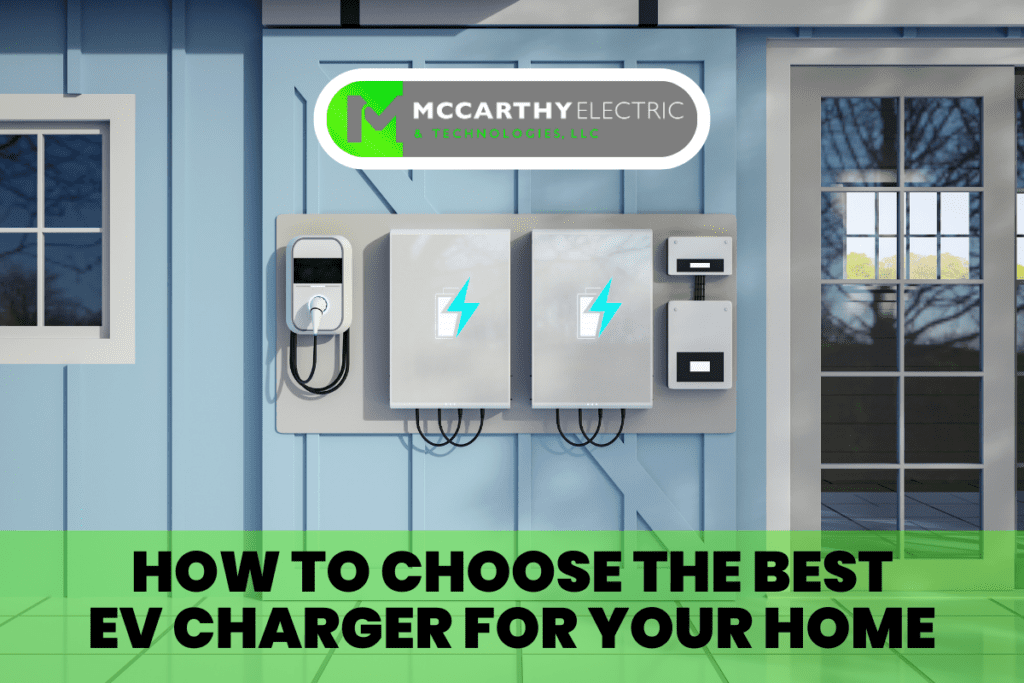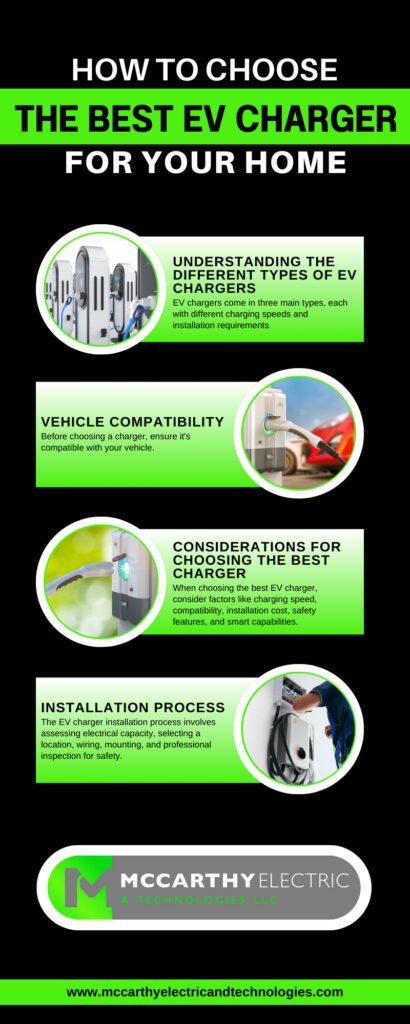Switching to an electric vehicle (EV) is a smart move toward sustainable living. To maximize the benefits of EV ownership, having the right home charging station is crucial. With so many options available, choosing the best EV charger for your home can be overwhelming. In this guide, we’ll break down the different types of EV chargers, their compatibility with various vehicles, and critical considerations like charging speed and installation costs to help you make an informed decision.
1. Understanding the Different Types of EV Chargers
EV chargers come in three main types, each with different charging speeds and installation requirements:
Level 1 Chargers
- Power Source: Standard 120-volt household outlet.
- Charging Speed: Slowest option, providing 2-5 miles of range per hour. It can take 20+ hours to charge an EV fully.
- Installation: Plug-and-play; no professional installation is required.
- Ideal For: Occasional EV drivers or plug-in hybrid vehicles (PHEVs) with smaller batteries.
Pros:
- No installation costs; uses a standard outlet.
- Convenient for overnight charging.
Cons:
- Very slow charging speed, not suitable for regular long-distance drivers.
Practical Tip: Use a Level 1 charger as a backup or temporary solution while you explore other options.
Level 2 Chargers
- Power Source: 240-volt outlet, similar to what is used for electric dryers.
- Charging Speed: It provides 10-60 miles of range per hour and takes 4-8 hours to fully charge most EVs.
- Installation: Requires professional installation by a certified electrician to set up a dedicated 240-volt circuit.
- Ideal For: Most EV owners who drive regularly and want faster, more efficient home charging.
Pros:
- Significantly faster than Level 1 chargers.
- Compatible with nearly all EV models.
Cons:
- Higher installation cost; requires a dedicated circuit.
Practical Tip: When selecting a Level 2 charger, choose one with adjustable amperage to match your home’s electrical capacity.
Learn more about our Level 2 EV charger installation services for homes.
Level 3 Chargers (DC Fast Chargers)
- Power Source: Direct Current (DC) power, requiring a complex electrical setup.
- Charging Speed: The fastest option, providing up to 250 miles of range per hour. Can charge an EV to 80% in 30 minutes.
- Installation: Expensive and typically unsuitable for residential use due to high power requirements.
- Ideal For: Commercial or public charging stations, not for home use.
Pros:
- Rapid charging, ideal for commercial use.
Cons:
- Very high installation and maintenance costs.
- Not recommended for home installation.
2. Vehicle Compatibility: Will the Charger Work with Your EV?
Before choosing a charger, ensure it’s compatible with your vehicle. Here’s what you need to know:
- Connector Types:
- J1772 Connector: Standard for most Level 1 and Level 2 chargers in North America, compatible with almost all EVs except for Tesla, which requires an adapter.
- Tesla Connector: Proprietary to Tesla vehicles but can use J1772 chargers with the correct adapter.
- Charger Amperage:
- Check your EV’s onboard charger capacity. Some vehicles can accept higher amperage, which allows for faster charging if the charger can supply it.
Practical Tip: Consult your vehicle’s manual or manufacturer’s website to determine the best charger capacity for your specific model.
3. Considerations for Choosing the Best Charger
Charging Speed:
- Your Driving Habits:
- If you drive frequently or have a long commute, a Level 2 charger is the best option for overnight charging.
- If you only drive occasionally or own a plug-in hybrid, a Level 1 charger may suffice.
- Future-Proofing:
- Consider a Level 2 charger even if your current vehicle has a smaller battery, as EVs with larger batteries may require faster charging in the future.
Installation Cost:
- Level 1: No installation cost; uses a standard outlet.
- Level 2: Installation costs range from $500 to $1,500, depending on the complexity of the electrical work required.
- Permits: Some areas may require a permit for installing a Level 2 charger, adding to the cost.
Find out more about the installation process and costs with McCarthy Electric & Technologies.
Charger Features:
- Smart Features: Some Level 2 chargers come with Wi-Fi connectivity, allowing you to monitor charging status, track energy usage, and schedule charging times to take advantage of off-peak electricity rates.
- Adjustable Amperage: Select a charger that lets you adjust the amperage to match your home’s electrical system safely.
Practical Tip: Opt for a smart charger if you want more control and monitoring options, especially if you want to optimize for cost savings.
4. Installation Process: What to Expect
Level 1 Installation:
- Simply plug into a standard outlet. No modifications or professional installation are needed.
Level 2 Installation:
- Hire a Professional: Always hire a certified electrician to assess your home’s electrical system and install the charger.
- Electrical Panel Upgrade: In some cases, an upgrade to the electrical panel may be necessary to handle the additional load.
- Permitting: Depending on local regulations, you may need a permit for the installation.
Practical Tip: Consider installing a dedicated 240-volt circuit in your garage or driveway for the charger to maximize safety and efficiency.
FAQs: Choosing the Right EV Charger for Your Home
Can I install a Level 2 charger myself?
It’s recommended to have a certified electrician handle the installation to ensure safety and compliance with electrical codes.
Will a Level 2 charger increase my electricity bill?
Yes, but charging during off-peak hours and using smart features to schedule charging can help minimize the cost.
Can I use a Level 2 charger with any EV?
Most EVs, including Tesla (with an adapter), can use a Level 2 charger.
Is it worth investing in a smart charger?
Yes, if you want to monitor charging, track energy usage, and optimize costs by charging during off-peak times.
Do I need to upgrade my home’s electrical panel?
It depends on your home’s current electrical capacity. A professional assessment is recommended before installation.
Expert Tips for Selecting and Installing Your Home EV Charger
- Choose a Higher Amp Level 2 Charger: Even if your current EV doesn’t need the maximum amperage, this prepares you for future EVs with larger batteries.
- Install Near Your Parking Spot: To avoid the need for extension cords, install the charger close to where you park.
- Go with a Smart Charger: Features like Wi-Fi connectivity and scheduling can save you money and provide a more user-friendly experience.
Contact McCarthy Electric & Technologies for expert advice on selecting the best EV charger for your home.


